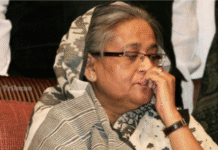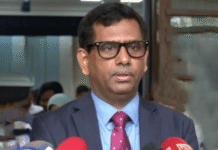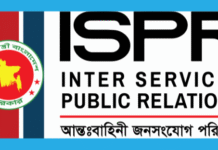River grabbing a criminal offence
In 17-point directive, High Court suggests stricter punishment for grabbing, polluting rivers, calls for an effective, independent Nat’l River Commission


All river grabbing and pollution are criminal offences, the highest court in the country has declared in the full text of a landmark judgment.
The court ordered the government to amend the National River Conservation Commission (NRCC) law and incorporate stringent provisions for imprisonment and hefty fines for the offences and to effectively empower the NRCC.
The High Court Division of the Supreme Court yesterday released the full text of its judgment delivered on February 3. It issued a 17-point directive to save the country’s rivers and waterbodies from grabbing and pollution.
The judgment came following a writ petition filed by Human Rights and Peace for Bangladesh. The organisation had cited The Daily Star report “Time to declare Turag dead” published on November 6, 2016, and the court yesterday thanked this paper for the report.
The court observed that photographs taken over several years since 2013, published along with the report, had made it crystal clear that the Turag had consistently been grabbed.
“Killing a river is virtually a collective suicide of all,” the court observed and added, “Killing a river is killing both the present and the future generations.”
“Bangladesh and its rivers have been inseparably integral,” it said, adding that our lifestyle, economy, culture, and traditions were all dependent on water and rivers.
The grabbing and pollution of the Turag has reached such a level that the court had to declare it a “person” and a living entity. The Turag is the third river in the world to receive the status. A river in Columbia and another in India has such status.
In its directives, the court declared the river commission as the legal guardian of all rivers and that it must act like their “parents”.
The state must act as the trustee of all rivers, hills, sea beaches, forests, canals, beels and other waterbodies while the NRCC would remain bound to protect them.
Any government authority, including the planning commission, LGED, Water Development Board, BIWTA, and BADC, have to obtain the NRCC’s no-objection certificate prior to going for any new scheme for any rivers, canals, and waterbodies.
All river-related authorities would have to cooperate with the NRCC to ensure river protection, navigability, development, and beautification, it said.
The verdict came at a time when river-grabbing by influential groups seemed unstoppable. Often, river grabbers returned soon after being evicted.
The court, while delivering the verdict in February, said playing blind man’s buff over protecting the rivers has to stop since the grabbers return and occupy rivers after their evictions.
The HC ordered the government to make a list of the grabbers and expose them by publishing the list in the media.
It also directed the Election Commission to disqualify the people responsible for river grabbing and pollution from running in elections to union parishads, upazila parishads, municipalities, city corporations and parliament.
River grabbers and polluters would also not be able get bank loans, the court said.
The Bangladesh Bank was ordered to make sure no river grabbers get bank loans.

The court asked the education ministry to take steps for holding an hour-long class every two months at all public and private academic institutions, including schools, madrasas, colleges, and universities, to build awareness about the importance of rivers.
The industries ministry was ordered to arrange an hour-long awareness meeting every two months with factory workers of the country.
Immediately after release of the full verdict yesterday, the NRCC sat to study the directives and content.
“The verdict is in favour of the country’s interest and in favour of conservation of rivers as national wealth,” NRCC Chairman Muzibur Rahman Howlader told The Daily Star.
It would greatly help the commission in doing its duty, he said.
The HC bench of Justice Moyeenul Islam Chowdhury and Justice Md Ashraful Kamal delivered the verdict on February 3.
Even though the BIWTA, since January, carried out a 36-day eviction drive along the Buriganga, Turag, and the Balu, and had torn down several hundred illegal structures on the river, it is yet to remove the earth and sand fillings and restore the rivers to their previous state.
The BIWTA has taken up a project to clear the illegal earth and sand filling in the Turag.
Following another judgment of the apex court in 2009, district administrations embarked on demarcating the four rivers around Dhaka excluding their foreshores and in deviation of the court’s directives.
This made way for permanent private ownership of the foreshores and encouraged river grabbers. The Buriganga, Turag, Balu, and the Shitalakkhya are set to officially shrink rather than be restored to their former glory.
According to an official estimate, the Shitalakkhya alone lost 1,860 acres.
Yesterday, Manzill Murshid, the lawyer for Human Rights for Peace for Bangladesh, citing the court’s directives said the chairmen of union, upazila, and zila parishads and of municipalities across the country have to make lists of people and organisations responsible for river grabbing and pollution and make them public by putting them on notice boards and billboards.
The authorities would make a database that would include maps and satellite images of all rivers, canals, beels and waterbodies in the country so that anyone could access those even at union-, municipality-, upazila- and district-level for a fee.









